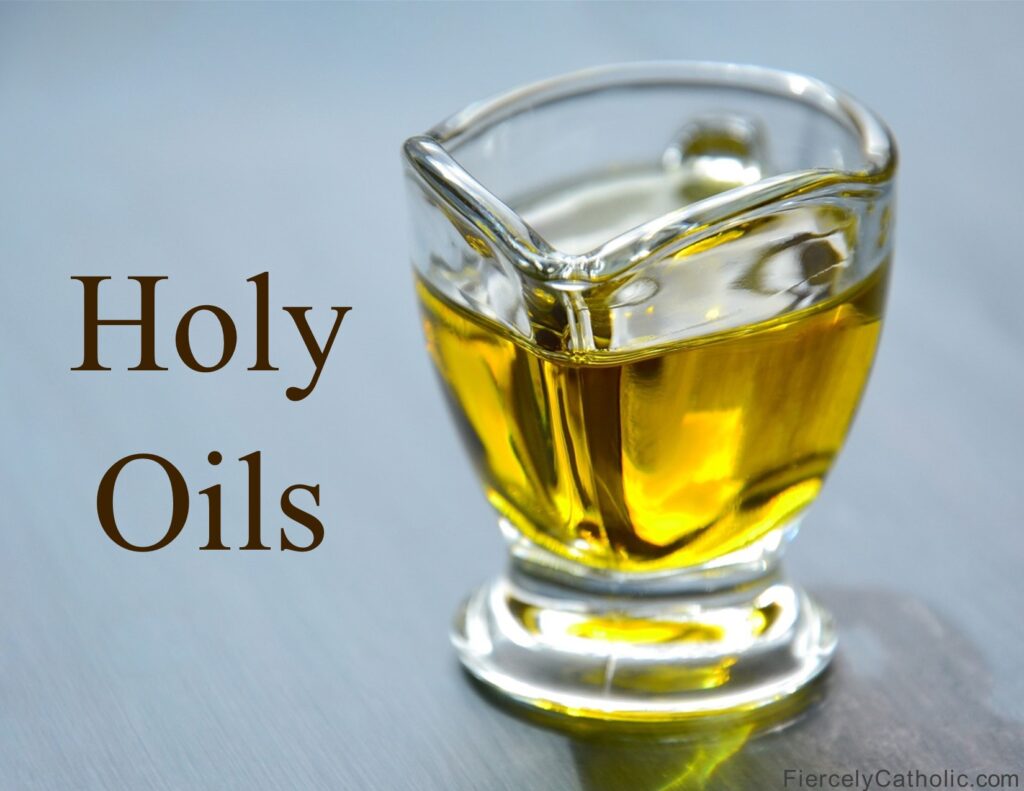
Once they are blessed, holy oils become vehicles of the life-giving grace of the holy spirit, bringing God’s strength, healing, comfort, and sanctification to the Catholic faithful.
Priests, kings, and prophets who prefigured Jesus throughout the Bible were anointed with oil, marking them as a person chosen by God for a sacred task and divinely equipped for their mission.
Christ was not Jesus’ name but a title indicating He was anointed with the Holy Spirit. Christos in Greek or Messiah in Hebrew means “Anointed One”. Holy oils allow Catholics to share in his anointing in the celebration of the sacraments.
The oil of catechumens and the oil of the sick are made of pure olive oil that is blessed, while sacred chrism is a consecrated mixture of olive oil and a sweet smelling resin called balsam.
The oil of catechumens, or oil of initiation, is used to anoint the chest or hands prior to Baptism. This anointing brings protection against difficulty and provides strength for the faith journey and wisdom to carry out God’s work.
Sacred chrism consecrates Catholics, setting them apart for God’s service in the Sacraments of Baptism, Confirmation, and Holy Orders. These three sacraments leave an permanent mark on the soul and can be received only once.
Those receiving the Sacraments of Baptism and Confirmation are anointed with sacred chrism, traced on their forehead with the Sign of the Cross.
In the Sacrament of Holy Orders, sacred chrism is used to consecrate the palms of the hands of the new priest. When a bishop is ordained, his head is anointed with sacred chrism.
Sacred chrism is also used in the dedication of a new church as a place of worship. It is also used to consecrate the altar where the Sacrifice of the Mass will take place, along with the vessels to be used at Mass.
The oil of the sick, or oil of the infirm, brings physical and spiritual healing to those who are seriously ill or in danger of death. In the Sacrament of Anointing of the Sick, oil is rubbed on the forehead and hands in the form of a cross.
Each year during Holy Week, the Chrism Mass is celebrated at the cathedral of every Catholic diocese where the bishop blesses all of the holy oils which will be used at the parishes throughout that diocese in the coming year.
These holy oils can be found in every Catholic Church, reverently displayed in an ambry, usually near the baptismal font.
Celebrating the sacraments with holy oils:
Oils used in the pastoral and sacramental life of the Church:
As for you, the anointing that you received from him remains in you, so that you do not need anyone to teach you. But his anointing teaches you about everything and is true and not false; just as it taught you, remain in him.
1 John 2: 27
The holy oils are gifts from God:
Oils of great significance and purpose:
Holy oils are liturgical tools:
Oil is the symbol of the Holy Spirit and at the same time it points us towards Christ: the word “Christ” (Messiah) means “the anointed one”. The humanity of Jesus, by virtue of the Son’s union with the Father, is brought into communion with the Holy Spirit and is thus “anointed” in a unique way, penetrated by the Holy Spirit. What happened symbolically to the kings and priests of the Old Testament when they were instituted into their ministry by the anointing with oil, takes place in Jesus in all its reality: His humanity is penetrated by the power of the Holy Spirit. He opens our humanity for the gift of the Holy Spirit. The more we are united to Christ, the more we are filled with his Spirit, with the Holy Spirit. We are called “Christians”: “anointed ones” – people who belong to Christ and hence have a share in his anointing, being touched by his Spirit. I wish not merely to be called Christian, but also to be Christian, said Saint Ignatius of Antioch. Let us allow these holy oils, which are consecrated at this time, to remind us of the task that is implicit in the word “Christian”, let us pray that, increasingly, we may not only be called Christian but may actually be such.
Pope Benedict XVI, Homily, 21 April 2011
Housing the holy oils in a beautiful way:
The ambry stores the holy oils:
Anointing with oil has all these meanings in the sacramental life. the pre-baptismal anointing with the oil of catechumens signifies cleansing and strengthening; the anointing of the sick expresses healing and comfort. the post-baptismal anointing with sacred chrism in Confirmation and ordination is the sign of consecration. By Confirmation Christians, that is, those who are anointed, share more completely in the mission of Jesus Christ and the fullness of the Holy Spirit with which he is filled, so that their lives may give off “the aroma of Christ.”
Catechism of the Catholic Church 1294
The bishop provides the holy oils:
The holy oils are a sign of the Church’s unity:
The Truth, Goodness, and Beauty of the Catholic Church
Preachers of truth in all its forms:
Share this page with friends and family to start a conversation about your faith.
Don’t miss a post. Learn more about the Catholic Church and strengthen your Catholic faith.
Find more Fiercely Catholic video issues here.
Subscribe here.


